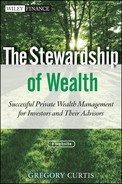Adding Value through Manager Selection
Although selecting good managers is the first thing most investors think of when talking about adding value, the sad fact is that in almost all cases managers will subtract value from the portfolio. I have devoted an entire chapter to the subject (and the perils) of the manager selection process, so I won't repeat that here.2 Instead, let's simply assume that selecting managers who will outperform net of all costs in the future, while they are managing our capital (rather than in the past, when they weren't), is extraordinarily difficult.
So how can manager selection add value? First, select your managers with care. Although it's very difficult to identify managers who will outperform, it's not so difficult to identify managers who are extremely competent, reasonably priced, and who invest in predictable ways.
Second, adopt a skeptical attitude. Unless you are very certain that a manager will add value, your default position should be to index. I don't necessarily mean index in the Vanguard S&P 500 Index Fund sense, because capitalization-weighted indexes present serious issues. But passive and structured products should always represent the default option.
Third, try not to think about individual managers as representing permanent positions in your portfolio. Instead, think about managers as arrows in your quiver of value-adding techniques that can be used opportunistically, as appropriate. For example, consider the case of a manager who uses a defensive style, buying only high-quality companies and raising cash when he doesn't like the looks of the market. I may have no idea whether that manager will outperform over a long period of time, but I can be pretty certain that he will outperform in treacherous market environments. If that's the kind of market I expect, that's the kind of manager I want. Once markets recover, I may not be so enthusiastic about that manager.
The same thing is true, for example, of a manager with a value bias. If value stocks have been on a tear, I can be pretty certain that my value manager isn't going to do too well over the next cycle. I should probably reduce my exposure to him.
Fourth, size your managers appropriately. Your largest positions should normally be in passive products like tax-aware index funds or structured funds. Around that position we can build “satellite” positions in managers whose styles—very different from index or “closet” index funds—give them a chance to outperform. But these positions won't typically be as large as the passive position.
Finally, think countercyclically. If I know a manager is very competent, and if I observe that he has underperformed in recent years, I can be pretty sure he will outperform over the next market cycle.
When you first begin working with a new client, it's very important to begin the education process with the family about managers. Falling in love with managers and focusing on them as the main hope for adding value is a rookie mistake. And because most families are rookies when it comes to the investment process, this is a very common error.
No matter how good a job you do in selecting managers, many of them will disappoint you. Therefore, if you live and die in your client's eyes on manager selection, you will have a very short lifespan.
One way to help get the client's focus off managers is to emphasize the many other ways in which you can add value to the portfolio. Hence this chapter.
